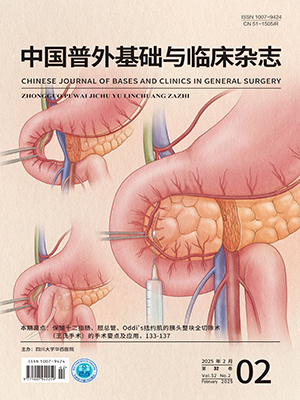| 1. |
汪晓东, 吕炘沂, 刘健博, 等. 数据库建设第七部分: 结直肠癌手术的特征(三). 中国普外基础与临床杂志, 2020, 27(12): 1568-1574.
|
| 2. |
汪晓东, 刘健博, 孟鑫宇, 等. 数据库建设第八部分: 结直肠癌手术反应及围术期并发症的标签与结构化. 中国普外基础与临床杂志, 2021, 28(4): 508-511.
|
| 3. |
国际生命科学学会中国办事处中国肥胖问题工作组联合数据汇总分析协作组. 中国成人体质指数分类的推荐意见简介. 中华预防医学杂志, 2001, 35(5): 349-350.
|
| 4. |
汪晓东, 孟鑫宇, 刘健博, 等. 数据库研究第八部分: 结直肠癌术后风险与并发症. 中国普外基础与临床杂志, 2021, 28(3): 369-375.
|
| 5. |
姚宏伟, 李心翔, 崔龙, 等. 中国结直肠癌手术病例登记数据库2019年度报告: 一项全国性登记研究. 中国实用外科杂志, 2020, 40(1): 106-110, 116.
|
| 6. |
张敏. 内脏型肥胖指标与体质指数对腹腔镜结直肠癌手术结果影响的差异性研究. 延安: 延安大学, 2019.
|
| 7. |
张海鑫. 骨盆及病理参数对腹腔镜中低位直肠癌手术难度的影响及相关评分系统的建立. 沈阳: 中国医科大学, 2019.
|
| 8. |
Nugent TS, Kelly ME, Donlon NE, et al. Obesity and anastomotic leak rates in colorectal cancer: a meta-analysis. Int J Colorectal Dis, 2021, 36(9): 1819-1829.
|
| 9. |
Li Q, Li D, Jiang L, et al. Factors influencing difficulty of laparoscopic abdominoperineal resection for ultra-low rectal cancer. Surg Laparosc Endosc Percutan Tech, 2017, 27(2): 104-109.
|
| 10. |
Senagore AJ, Delaney CP, Madboulay K, et al. Laparoscopic colectomy in obese and nonobese patients. J Gastrointest Surg, 2003, 7(4): 558-561.
|
| 11. |
Pikarsky AJ, Saida Y, Yamaguchi T, et al. Is obesity a high-risk factor for laparoscopic colorectal surgery? Surg Endosc, 2002, 16(5): 855-858.
|
| 12. |
Zhou XC, Su M, Hu KQ, et al. CT pelvimetry and clinicopathological parameters in evaluation of the technical difficulties in performing open rectal surgery for mid-low rectal cancer. Oncol Lett, 2016, 11(1): 31-38.
|
| 13. |
Chern H, Chou J, Donkor C, et al. Effects of obesity in rectal cancer surgery. J Am Coll Surg, 2010, 211(1): 55-60.
|
| 14. |
Sun Y, Chi P. Impact of body mass index on surgical and oncological outcomes in laparoscopic total mesorectal excision for locally advanced rectal cancer after neoadjuvant 5-fluorouracil-based chemoradiotherapy. Gastroenterol Res Pract, 2017, 2017: 1509140.
|
| 15. |
Makino T, Shukla PJ, Rubino F, et al. The impact of obesity on perioperative outcomes after laparoscopic colorectal resection. Ann Surg, 2012, 255(2): 228-236.
|
| 16. |
Veenhof AA, Engel AF, van der Peet DL, et al. Technical difficulty grade score for the laparoscopic approach of rectal cancer: a single institution pilot study. Int J Colorectal Dis, 2008, 23(5): 469-475.
|
| 17. |
Shimada T, Tsuruta M, Hasegawa H, et al. Pelvic inlet shape measured by three-dimensional pelvimetry is a predictor of the operative time in the anterior resection of rectal cancer. Surg Today, 2018, 48(1): 51-57.
|
| 18. |
Okugawa Y, Toiyama Y, Yamamoto A, et al. Lymphocyte-C-reactive protein ratio as promising new marker for predicting surgical and oncological outcomes in colorectal cancer. Ann Surg, 2020, 272(2): 342-351.
|
| 19. |
Wierdak M, Pisarska M, Kuśnierz-Cabala B, et al. Serum amyloid a as an early marker of infectious complications after laparoscopic surgery for colorectal cancer. Surg Infect (Larchmt), 2018, 19(6): 622-628.
|
| 20. |
Giessen-Jung C, Nagel D, Glas M, et al. Preoperative serum markers for individual patient prognosis in stage Ⅰ–Ⅲ colon cancer. Tumour Biol, 2015, 36(10): 7897-7906.
|
| 21. |
Chaichian S, Kabir A, Mehdizadehkashi A, et al. Comparing the efficacy of surgery and medical therapy for pain management in endometriosis: a systematic review and meta-analysis. Pain Physician, 2017, 20(3): 185-195.
|
| 22. |
Leite HR, Dario AB, Harmer AR, et al. Contributions of birthweight, annualised weight gain and BMI to back pain in adults: a population-based co-twin control study of 2754 Australian twins. Eur Spine J, 2019, 28(2): 224-233.
|
| 23. |
Leysen L, Beckwée D, Nijs J, et al. Risk factors of pain in breast cancer survivors: a systematic review and meta-analysis. Support Care Cancer, 2017, 25(12): 3607-3643.
|




